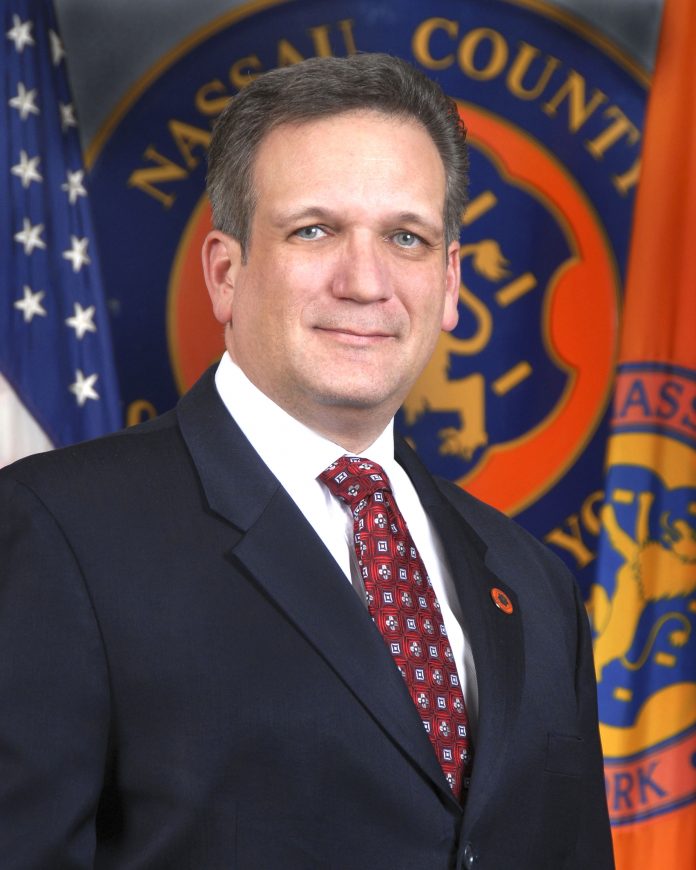Federal prosecutors in the corruption case of former Nassau County Executive Edward Mangano have denied withholding evidence favorable to the defense.
The prosecutors’ response came in court filings late Friday night, the deadline given by U.S. District Court Judge Joan Azrack to respond to a request for dismissal by Mangano’s attorney Kevin Keating. Keating argued that the prosecution withheld a key witness and evidence favorable to the defense in December court filings.
“Mangano’s arguments are meritless once the hyperbole and accusations are stripped away,” the prosecution’s response said.
The prosecution argued in opposition to dismissal of the case that the claims by Keating are baseless, that no violations of a rule requiring prosecutors to turn over exculpatory evidence are demonstrated and the evidence cited by the defense does not demonstrate any perjury was committed by Harendra Singh, a key witness against Mangano.
Keating was unavailable for comment.
One of the focuses of Keating’s argument for dismissal was the revelation of “key witness” Meredith Hughes, whose testimony could have helped exonerate Mangano and his wife, Linda, based on post-trial interviews conducted by Newsday, Keating said.
Hughes was the deputy majority counsel to the Nassau County Legislature at the time of the events surrounding the awarding of a lucrative bread and rolls contract. Hughes stated under oath that she was the individual who originally brought the contract to the county Legislature’s presiding officer, the late Peter Schmitt, and he was immediately interested in awarding all or part of the contract to San Remo Bakery, filings by the defense said.
The contract was awarded to the bakery, owned by Singh, who pleaded guilty to eight charges, including bribery, in October 2016, and testified that he had bribed Edward Mangano in return for various favors.
The prosecution responded that Hughes’ account was not critical to Mangano because the defense already received similar information from Chris Ostuni, who was Schmitt’s counsel, and did not call on him to testify in the first trial.
The first trial lasted 12 weeks and ended in a mistrial in May 2018.
“While Mangano argues nefarious intent on the part of the government by highlighting a few emails, his motion papers are devoid of any context and wholly fail to paint a complete picture of the extent of the enormous scope of the investigation, the complex nature of the case, and the voluminous discovery produced to the defense throughout this case,” the prosecution said.
Prosecutors also dismissed the defense’s claims that they knowingly allowed Singh to testify falsely.
Following the mistrial, the prosecution re-examined all of the files and material, even if it was considered marginally related to the case, in an effort to comply with Constitutional obligations, and turned the information over to the defense, the filing said.
Among that information were over 2,700 recordings from the government’s wiretapping of Singh.
In the initial trial, Singh testified that he gave Mangano gifts in exchange for official action, including the leasing of commercial space at below market value, the filings said.
The defense argued that the documents regarding those leases were forgeries, but the prosecution said that under cross-examination, Singh testified that he did not personally deal with the written lease documents, that he had a staff that handled it, and that he did not know if those documents were forgeries.
The prosecution also disclosed to the defense prior to the trial that Singh “forged, or had others forge on his behalf, various documents,” court filings said.
“The evidence cited by Mangano does not demonstrate that Singh committed perjury,” the prosecution’s filing said.
“Mangano’s attacks on the prosecutors’ integrity are unfounded and unfair,” the prosecution wrote. The prosecution said that the court should not give credence to Mangano’s baseless allegations and should deny his request for a dismissal or in camera review of the government’s intentions in the case.
Edward Mangano is charged with seven felony counts, including bribery, honest services wire fraud, extortion and conspiracy to obstruct justice.
Linda Mangano is charged with five counts, including conspiracy to obstruct justice, obstruction of justice and making false statements to the FBI. Both Manganos have pleaded not guilty.
The retrial is scheduled to begin Jan. 22.



